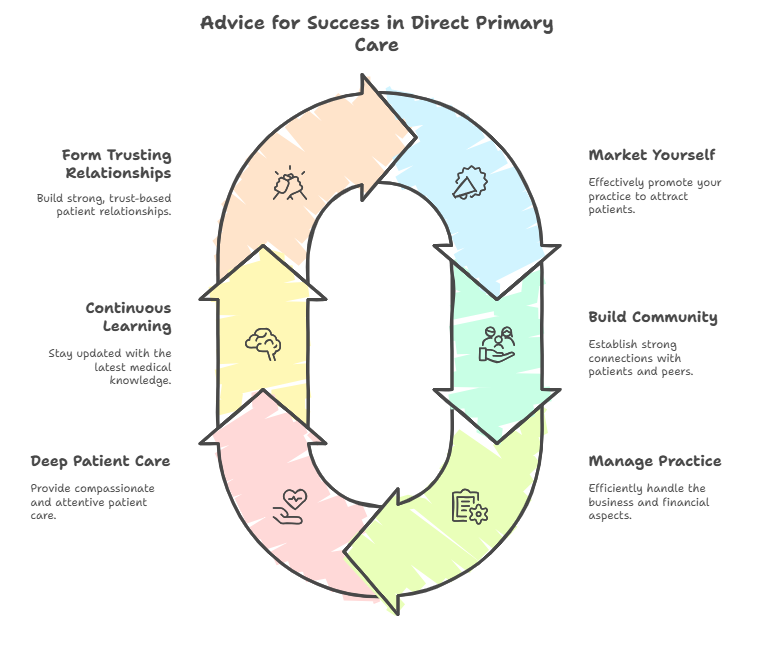Health Compiler and Hint Collaborate to Enhance Primary Care Practice Growth

Dr. Jeff Panzer
From Family Traditions to Transformative Care:
Dr. Jeff Panzer Medical Journey
Inspired by his father’s legacy as a family doctor, Dr. Jeff Panzer has taken a transformative step in his career by embracing Direct Primary Care (DPC). In a conversation with Mohit Pande from Health Compiler, Dr. Panzer shares the inspiring story behind his transition from traditional medicine to a more patient-focused, relationship-driven approach. This change is not just about switching careers—it's about reshaping the future of healthcare and returning to the core values that define true medical care.
The Roots of Healing
Dr. Panzer's journey into medicine started when he was a child in Pennsylvania. His father, a beloved family doctor who showed him the importance of truly connecting with patients. As a kid, Dr. Panzer often watched his dad visit patients at their homes, offering not just medical care but also comfort and trust. These experiences had a big impact on him and shaped his idea of a more personal and caring approach to healthcare. "I saw how just being there could make someone feel better," Dr. Panzer remembers.
"Even as a child, I knew that being a doctor is not just about treating illnesses—it's about building relationships and being there for people when they need you the most."
Seeing his father's compassionate approach, Dr. Panzer learned that medicine is more than just diagnosing and treating conditions. It's about understanding patients as whole people, with their own unique stories and challenges. This early experience with the human side of medicine planted the seed for Dr. Panzer's vision of a more empathetic and relationship-focused approach to healthcare. Over the years, this vision guided his path and inspired him to find ways to make a real difference in his patients' lives.
A Global Perspective
Dr. Panzer’s quest to understand healthcare on a larger scale led him to Ethiopia, where he spent a year immersed in a healthcare system that was a lifeline rather than a luxury. There, he learned a critical lesson: healthcare, no matter where it’s delivered, is always about people, not just processes. This experience shifted his view of healthcare as a fundamental right and a vital tool for social justice.
"It's not just about treating diseases; it’s about understanding people's lives and their unique circumstances," he says, comparing his experiences in Ethiopia to the challenges faced by the urban poor in the U.S.
"Healthcare should be about empathy and addressing the holistic needs of individuals."
The American Healthcare Journey
When Dr. Panzer returned to the U.S., he entered the complex world of American healthcare, beginning his journey at the Erie Family Health Center in Chicago. There, he encountered the rise of Electronic Medical Records (EMRs) and the patient-centered medical home model, which aimed to offer personalized care similar to what his father had provided. However, these models often fell short, focusing on metrics and documentation instead of meaningful relationships.
"I became the EMR physician champion out of necessity," he laughs, "but I quickly saw that healthcare had become about ticking off boxes, not about knowing your patient. The human element was being lost in the sea of data."
His career led him to innovative companies like Oak Street and Iora, where he delved into value-based care models. Even so, he found that the system still prioritized measurable outcomes over the immeasurable value of patient relationships. "While these models had their merits, they often missed the essence of what makes healthcare truly impactful—genuine human connections."
The Leap to Direct Primary Care
The turning point came when Dr. Panzer co-authored an article in the New England Journal of Medicine titled “Solution Shop in the Production Line,” which critiqued the healthcare system’s focus on performance metrics over holistic care. This article marked the beginning of his return to the essence of medicine.
"Inspired by friends like Ricky Haug and Amy Ostek, who had embraced DPC, I saw a way to practice medicine that truly resonated with me," he shares. His decision to start his DPC practice was not just a way to escape the bureaucracy—it was about renewing the doctor-patient relationship and returning to the roots of compassionate care.
Building Trust, One Story at a Time
In his Evanston practice, Dr. Panzer takes a personalized approach, striving to know his patients beyond their medical charts. “Tell me your story,” he often begins his consultations, inviting patients to share more than just their symptoms. This method has allowed him to build deep, meaningful connections with his patients.
He recalls a patient he'd known for years but only truly understood after they joined his DPC practice. "I learned about his struggles with alcohol and his family history—things I had never known before," he reflects, emphasizing how DPC allows for a depth of interaction that traditional models simply can’t offer. "This level of understanding and connection is what makes DPC so powerful."
The Challenges of Change
Despite the personal satisfaction he finds in his work, Dr. Panzer is candid about the challenges of running a DPC practice, from financial sustainability to patient acquisition. "It’s been hard," he admits. "You talk to thousands of people, but growth can be slow." However, he believes this struggle is part of a broader movement towards healthcare reform, with DPC playing a crucial role—especially as new technologies and policies, like the DPC for Medicaid bill, emerge.
"Building a practice from the ground up is no easy feat," he acknowledges. "But the rewards of knowing you're making a real difference in people's lives make it all worth it."
A Vision for Healthcare IT
Dr. Panzer envisions a future where healthcare IT goes beyond simple record-keeping to become a means of fostering meaningful collaboration between patients and doctors. Inspired by works like The World Without Email and Team of Teams, he advocates for platforms that enhance patient-doctor interaction. He believes that leveraging advanced data analytics can transform healthcare by providing deeper insights into patient health, predicting potential issues, and personalizing treatment plans. This data-driven approach can lead to more proactive, preventative care and streamline healthcare operations, ultimately improving patient outcomes and operational efficiency.
"Technology should support the human side of healthcare, not hinder it," Dr. Panzer insists. He criticizes current systems for prioritizing documentation over real patient interactions and envisions IT systems that facilitate better communication and collaboration among healthcare teams. By integrating data analytics with user-friendly platforms, Dr. Panzer sees a future where technology enhances the doctor-patient relationship, making healthcare more empathetic and effective.
Advice for the Next Generation
For those thinking about a career in Direct Primary Care (DPC), Dr. Panzer has some advice. "It's very rewarding but also tough," he says. "You'll need to market yourself well, build a community, and put all your energy into your practice for it to succeed."
Success in DPC isn't just about medical skills; it means caring for your patients deeply and managing your practice well. It's essential to build trust and form strong relationships with your patients. Keeping up with the latest medical knowledge and being part of professional networks are also important.

Dr. Panzer mentions that starting a DPC practice can be challenging due to financial pressures and business demands. "It can be difficult to get started and keep it going," he admits. "But the joy of making a difference in people's lives makes it worth it."
He encourages new DPC doctors to stay committed and focused, creating an environment where patients feel valued and understood. By putting relationships first and truly listening to patients' stories, healthcare professionals can make a meaningful impact in their field.
Books and Ideas That Shape Dr. Panzer’s Approach
Outside of medicine, Dr. Panzer is a passionate reader. He recommends books like The World Without Email by Cal Newport, which critiques communication tools that often complicate healthcare, and The Covenant of Water by Abraham Verghese, which explores the cultural dimensions of healthcare. He believes that reading helps doctors build empathy and understand their patients better.
"Reading broadens your perspective and deepens your understanding of the human experience," he says. "It allows you to connect with your patients on a more profound level."
Conclusion
Dr. Jeff Panzer’s story is not just one doctor’s journey—it’s a movement in medicine, a return to personal, patient-centered care. His practice in Evanston serves as a model for how healthcare can be. In a world where healthcare often feels more like an industry, Dr. Panzer reminds us that it’s fundamentally about human lives and the stories we share.
As he continues to combine care with a passion for innovation and policy, Dr. Panzer stands as an example of what healthcare professionals can achieve when they prioritize relationships over routines, and stories over statistics. His journey invites us to rethink healthcare as not just a service, but a calling, where every patient’s narrative is as important as their diagnosis.
This article is part of Health Compiler's Apex Initiative, showcasing transformative innovations in healthcare delivery. For more information about joining this healthcare revolution,
Contact Us
Interested to share your story?
Contact us today & Let us know!
We will get back to you as soon as possible
Please try again later

+1 415 657 8241
Health Compiler Inc.
2261 Market Street #4632
San Francisco, CA 94114
All Rights Reserved | Health Compiler Inc.
Made with ❤️ in San Francisco

QUICK LINKS
RESOURCES
LET'S STAY IN TOUCH
Contact Us
We will get back to you as soon as possible.
Please try again later.

